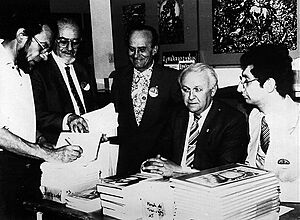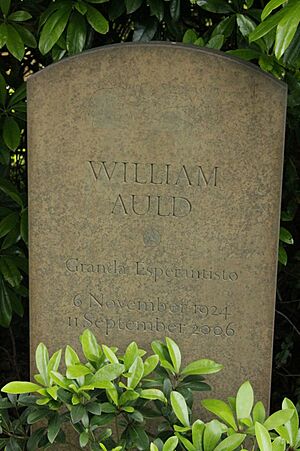William Auld facts for kids
Quick facts for kids
William Auld
|
|
|---|---|

Writers in Antwerp in 1982, from left Georges Lagrange, Tibor Sekelj, Aldo de 'Giorgi, William Auld and publisher Brucjo Casini.
|
|
| Born | 6 November 1924 Erith, England |
| Died | 11 September 2006 (aged 81) Dollar, Scotland |
| Occupation | Poet, writer, translator, esperantist, essayist, musician, editor |
| Language | Esperanto, English |
William Auld (born November 6, 1924 – died September 11, 2006) was a talented writer, poet, and translator from Britain. He is famous for writing most of his works in Esperanto, a special international language. He also edited many magazines and helped spread the use of Esperanto around the world.
Contents
Life and Work

William Auld was born in Erith, England. Later, his family moved to Glasgow, Scotland, where he went to Allan Glen's School. During World War II, he served as a pilot in the Royal Air Force, flying Spitfire planes. After the war, he studied English literature at Glasgow University and became a teacher.
In 1952, he married his childhood sweetheart, Margaret (Meta) Barr Stewart, who also spoke Esperanto. They had two children. In 1960, he started teaching at a secondary school in Alloa, where he stayed for the rest of his life.
William Auld was nominated for the Nobel Prize in Literature three times: in 1999, 2004, and 2006. This was a very special achievement because he was the first person ever nominated for works written in Esperanto.
His Masterpiece: La infana raso
His most famous work is a long poem called La infana raso, which means The Infant Race. In this poem, Auld explored big ideas about "the role of the human race in time and in the cosmos." It's a deep and thoughtful poem that makes readers think about humanity's place in the universe.
His Connection to Esperanto
Auld began learning Esperanto in 1937. However, he became very active in promoting the language after 1947. From then on, he wrote many books and poems in Esperanto. He also worked as an editor for several magazines and reviews, including Esperanto en Skotlando, Esperanto, and La Brita Esperantisto.
He held important positions in the Esperanto world. He was the Vice President of the Universal Esperanto Association (from 1977 to 1980) and the President of the Academy of Esperanto (from 1979 to 1983). He also led the Esperanto PEN Centre, which is a group for writers, from 1999 to 2005.
In 2001, William Auld gave his personal collection of nearly 5,000 books written in or about Esperanto to the National Library of Scotland. This collection is now kept there for everyone to use and learn from.
William Auld passed away in Dollar, Scotland, and is buried in the Dollar churchyard.
Selected Works
William Auld wrote many different kinds of books, from poetry to textbooks and translations.
Poetry Collections
- Spiro de l' pasio (1952)
- La infana raso (1956)
- Unufingraj melodioj (1960)
- Humoroj (1969)
- Rimleteroj (with Marjorie Boulton, 1976)
- El unu verda vivo (1978)
- En barko senpilota (Edistudio, 1987)
- Unu el ni (1992)
Anthologies (Collections of Works)
- Angla antologio 1000–1800 (poetry editor, 1957)
- Esperanta antologio (1958/1984)
- 25 jaroj (poetry editor, 1977)
- Skota antologio (associate editor, 1978)
Translations from English
William Auld translated many famous books and plays into Esperanto, making them available to more readers.
- La balenodento, by Jack London (1952)
- Epifanio, by Shakespeare (1977)
- La robaioj de Omar Kajam, by Edward Fitzgerald (1980)
- La sonetoj, de Shakespeare (Edistudio, 1981)
- La graveco de la Fideliĝo, by Oscar Wilde (1987)
- La komedio de eraroj, by Shakespeare (with Asen M. Simeonov, 1987)
- La stratoj de Aŝkelono, by Harry Harrison (1994)
- The Lord of the Rings series by J. R. R. Tolkien:
- La kunularo de l' ringo (1995)
- La du turegoj (1995)
- La reveno de la reĝo (1997)
- La hobito, by J. R. R. Tolkien (poems and songs; with Christopher Gledhill, 2000)
- La Hobito, aŭ Tien kaj Reen, by J. R. R. Tolkien (poems and songs; with Christopher Gledhill, Evertype 2015, ISBN: 9781782011101, ISBN: 9781782011095)
- Kantoj, poemoj kaj satiroj, by Robert Burns (with Reto Rossetti, 1977)
Other Translations
- Aniaro, by Harry Martinson (from Swedish with Bertil Nilsson, 1979)
Song Collections
William Auld also helped translate British folk songs into Esperanto.
- Floroj sen kompar' (with Margaret Hill, 1973)
- Kantanta mia bird' (with Margaret Hill, 1973)
- Dum la noktoj (with Margaret and David Hill, 1976)
Textbooks
He wrote several textbooks to help people learn Esperanto.
- Esperanto: A New Approach; (1965)
- Paŝoj al plena posedo (1968)
- A first course in Esperanto (1972)
- Traduku! (1993)
Essay Collections
- Facetoj de Esperanto (1976)
- Pri lingvo kaj aliaj artoj (1978)
- Enkonduko en la originalan literaturon de Esperanto (1979)
- Vereco, distro, stilo (1981)
 | Laphonza Butler |
 | Daisy Bates |
 | Elizabeth Piper Ensley |

